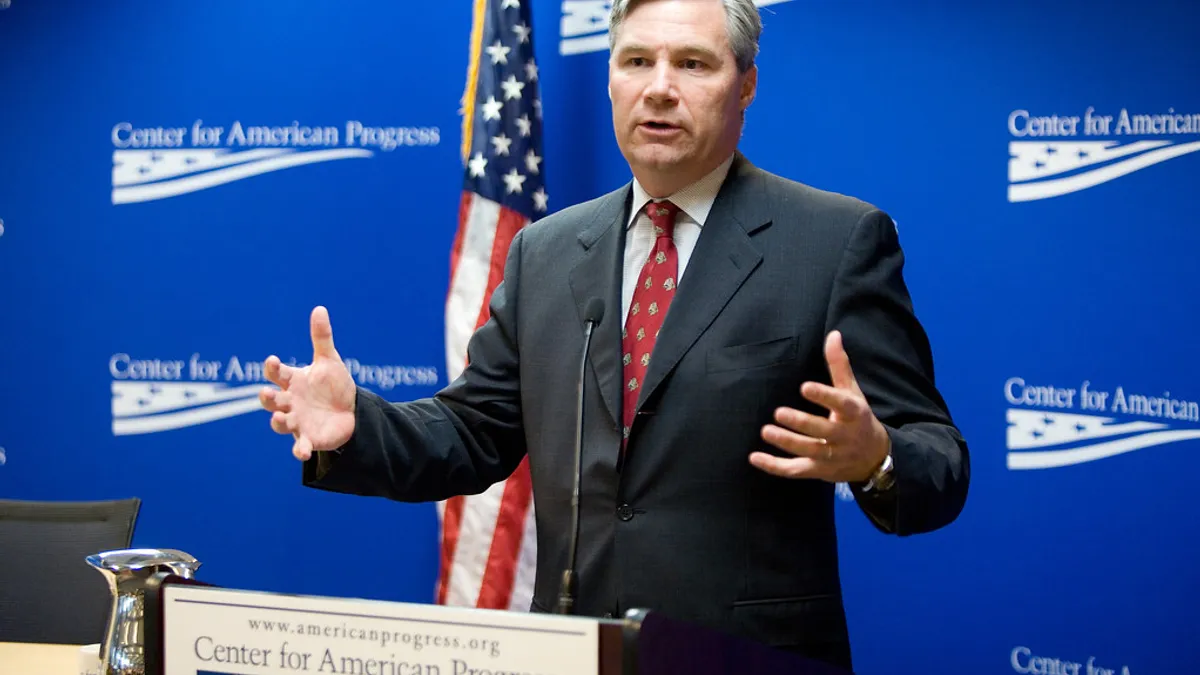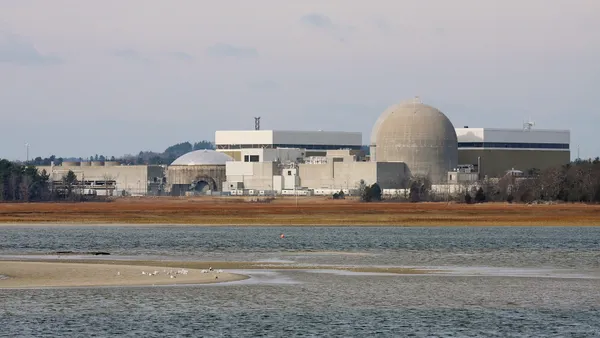Dive Brief:
- There's a lot of "pent-up pressure" in Congress to do a comprehensive climate change-related bill, which could include significant infrastructure investments, carbon pricing policies, new standards for the electric utility mix and support for electric vehicles, Sen. Sheldon Whitehouse, D-R.I., said Monday at the Greentech Media power and renewables summit.
- If Democrats achieve a Senate majority in November, or have a tie and a Democratic vice president who would break the tie in their favor, "then we can make sure that a climate bill comes to the floor and … then the substantive politics of what should be in it begin to open up," Whitehouse said.
- But if Democrats do not gain a majority in the Senate, "that's a more difficult path," according to Whitehouse. "[T]he path involves corporate America stepping up and expressing its concern."
Dive Insight:
For a long time, corporate America has not played a significant role on climate change in Congress, according to Whitehouse. However, more recently, big agricultural companies have grown spooked over the impact of climate change on crops and on supply chains, while the financial community is worried about the economic turmoil that could be caused by a changing climate, he said.
"So for corporate America, this is starting to move out of consumer relations and investor relations and public relations. And it's just beginning to be something that they might be willing to show up and fight for," Whitehouse added.
A massive shift in the private sector is already underway, with companies developing a better sense of how to quantify the financial and physical risks tied to climate change, and investors applying increased pressure on companies to disclose these risks, agreed Brad Townsend, managing director for strategic initiatives at the Center for Climate and Energy Solutions.
"We are working with a lot of large companies, many of whom we have seen in conversations with congressional staff advocating for ambitious and comprehensive climate policy, so I think there's more of that happening than might perhaps be widely known," Townsend said, adding that the challenge in a post-COVID landscape is articulating that climate can be part of the solution rather than a competing policy.
In the event that Joe Biden does win the presidential election but Republicans retain a Senate majority, Whitehouse cautioned against trying to implement policies using administrative action and regulation, noting that that path likely ends up in litigation.
Instead, Whitehouse said, the President would be better advised to work through corporate America, put pressure on Republican senators and emphasize the economic warnings to build a case for getting something done legislatively.
"A legislative solution will ultimately, I believe, be faster, more durable, more robust and more effective, and I would focus on that first and foremost," Whitehouse added.
One issue that Whitehouse views as a "baseline criterion for a credible climate bill" is putting a price on carbon. Carbon capture has seen bipartisan progress, Whitehouse said, but "you can't have an industry of capturing carbon … if it's free to pollute. There's no revenue proposition for that."
The Federal Energy Regulatory Commission has a lot of opportunities to allow markets to implement carbon pricing, according to Whitehouse.
There have been indications of bipartisan support for some climate action, according to Townsend — such as the Clean Economy Jobs and Innovation Act that was passed by the House last week, as well as the American Energy Innovation Act that's "tantalizingly close" to getting floor time in the Senate, Townsend said.
"Both contain a number of pieces that demonstrate that there's already a growing bipartisan consensus around things," Townsend said, adding that with a divided Congress and executive branch, there would likely be a continued focus on those aspects.
Over 13% of the renewables workforce is unemployed due to COVID-19, and enacting emergency relief measures like temporary access to refunds for renewable energy tax credits, among others, could stem job losses, prevent falling behind further on climate commitments and help the renewable energy sector drive the country's economic recovery, according to Gregory Wetstone, president and CEO of the American Council on Renewable Energy. Over the longer term, the focus will be on an ambitious climate agenda that builds on state renewable standards, provides a level playing field for clean energy in the tax code, and includes efforts to expand and upgrade antiquated transmission infrastructure.
"There is a long history of bipartisan support for renewable power, and we look forward to working on this agenda with policymakers on both sides of the aisle," Wetstone said in an emailed statement.















